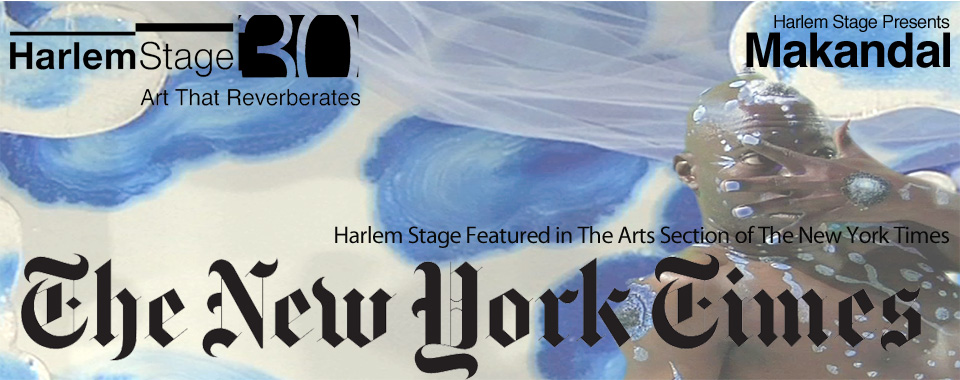As Haitians, We Are The Keepers Of Our Legacy
Coming to Harlem Stage in 2014: Makandal, The Opera
From The New York Times
by Felicia R. Lee
Since its founding 30 years ago, Harlem Stage has burnished its reputation by presenting innovative artists like Bill T. Jones and Vijay Iyer and plumbing social issues. Now, the theater is betting that “Makandal” — its first opera commission and an ambitious, contemporary work revolving around the leader of an 18th-century slave revolt in Haiti — will raise its international profile and win it respect as a producer. But the group faces large hurdles.
For starters, Harlem Stage still needs to raise about $500,000 for its plan to produce and tour the multimedia opera in the United States, Haiti and South Africa once it has its premiere next fall at the company’s 196-seat performing-arts center, called the Gatehouse, at 135th Street and Convent Avenue in Hamilton Heights. While Harlem Stage’s works have traveled before, it has never before taken sole responsibility for producing and touring. There are also a host of practical considerations in transferring the two-hour opera’s video projections, animation and lighting to places like a park in Port-au-Prince.
Still, Patricia Cruz, Harlem Stage’s executive director, views “Makandal” as an opportunity to attract new financers and producing partners for the organization, which has an annual operating budget of around $3 million. And between the upheaval in Egypt, immigration debates and the fallout over the killing of Trayvon Martin, she said the times were right to use the escaped slave and rebel François Makandal to explore questions about immigration, race and liberation.
“It is super-ambitious,” Ms. Cruz said of the project. “In order to advance our work and the artists we present, we need to do more — not just in the Harlem community or just in New York.” She said the opera form allows its creators “to mix the mythic, the historic and contemporary tragedies with the idea of hope and the idea of change.”
“Makandal” was five years in the making. It was conceived and written by Carl Hancock Rux, who is also a performance artist. His work includes the play “Talk,” and he originated the title role in Robert Wilson and Bernice Johnson Reagon’s opera, “The Temptation of St. Anthony.” The director is Lars Jan, a genre-bending media artist. Jazz, classical and traditional Afro-Cuban music ripple through the score, written by Yosvany Terry, a composer born in Cuba. Edouard Duval-Carrié, the visual designer whose politically charged art is featured in the opera, was born in Port-au-Prince.
With nine actors (all trained singers) playing multiple roles, “Makandal” also tells the contemporary story of a boatload of Cuban, Dominican and Haitian immigrants embarking on a boat ride to a better life. It is a layered story: In the center is the tale of Makandal, a slave who escapes a Haitian plantation, hides out in the hills, leads a group of revolutionaries plotting an overthrow of colonial powers and is captured and burned alive at the stake in the public square in Cap-Haïtien in 1758. “Makandal” is not strictly biographical, though, as it shifts between myth and reality, the past and the present.
Harlem Stage officials say the opera project is well on its way. Performance spaces in both South Africa and Haiti are in the pipeline, although Ms. Cruz declined to name them. A “Making Makandal” marketing and fund-raising campaign will begin in September, with events like films, readings and concerts leading up to the premiere, for which no date has been set. One-third of the approximately $750,000 needed has already been raised from individual donors, corporations and foundations.
“I think it’s within their capacity,” said Sandra L. Gibson, an arts consultant and former president of the Association of Performing Arts Presenters, with 2,000 members worldwide. “These global cultural exchanges are not just the province of larger institutions. We found from our research that three-fourths of the field has been engaged in global cultural exchange. The size of your entity is not a factor; it was your community, your interest, your mission and your capacity to do this.”
There is little downside to “Makandal” even if it does not reach all of its goals, said Michael M. Kaiser, the president of the John F. Kennedy Center for the Performing Arts and the founder of the center’s DeVos Institute of Arts Management. “The next time, you come back with a different project,” Mr. Kaiser said, building a reputation that does not rely on one hit or miss but a steady series of exciting ventures.
For Mr. Rux, the opera grew out of his three-year residency at what is now called the Adrienne Arsht Center for the Performing Arts of Miami-Dade County, which started in 2005.
A series of interviews with Haitians and Cubans led him to the story of Makandal, an escaped slave from a sugar plantation who led the failed revolt. According to myth, Makandal developed wings and flew away upon his execution.
Justin Macdonnell, a former artistic director of the Miami center, initially approached Harlem Stage to become a partner in producing “Makandal,” Mr. Rux recalled. Harlem Stage eventually became the sole producer when the Miami center went through a restructuring and dropped out, but the Miami group will receive a co-commissioning credit because of its involvement.
The Makandal host committee, assembled to drum up support and interest in the project includes Donna Karan and the novelist Edwidge Danticat, who is from Haiti. Rosemonde Pierre-Louis, the deputy Manhattan borough president who is of Haitian descent, attended a recent “Makandal” preview to interest the news media and underwriters. “Makandal is such an important and endearing figure for Haitians,” Ms. Pierre-Louis said in an interview. “In Haiti, this will be embraced. Securing the venue will not be an issue.”
For the full story, visit The New York Times.
